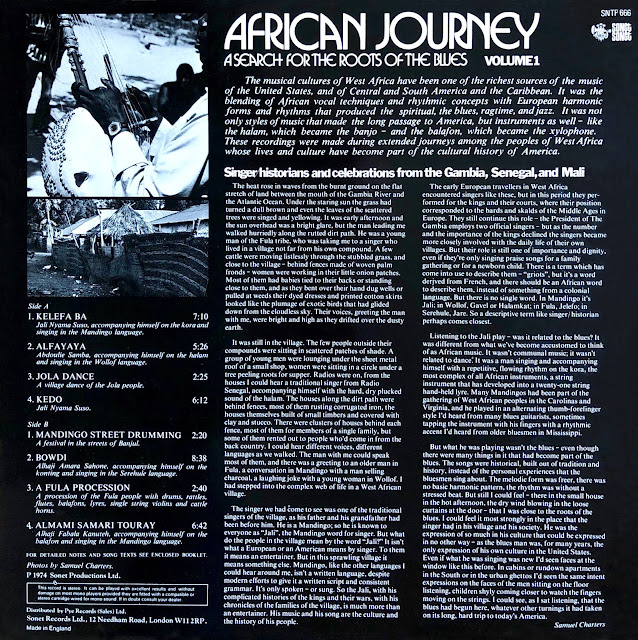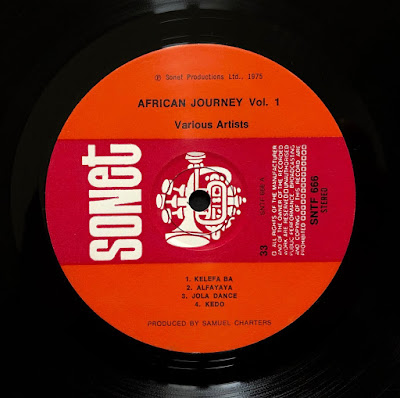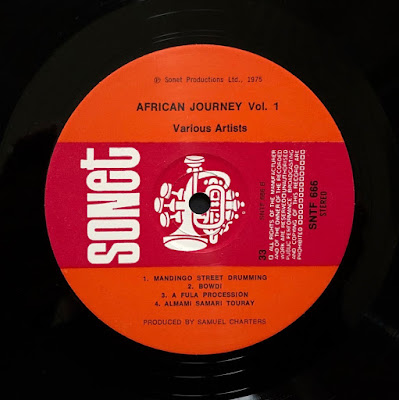African Journey – A Search for the Roots of the Blues Volume 1 – Sonet SNTP 666, recorded by Samuel Charters, 1974 (LP)
Samuel Charters (1929-2015) was an American music historian, writer, record producer, musician and poet with a keen interest in folk, jazz and blues. Charters published the seminal The Country Blues in 1959 and was instrumental in the resurgent interest in blues and folk in the 1960s expressed by artists and bands like John Lee Hooker, Muddy Waters, Cream, The Rolling Stones and Bob Dylan. Charters also recorded many jazz and blues artists, as well as two LPs of the Bahamian folk guitarist Joseph Spence on the Folkways label.
His interest in black music led the ever-inquisitive and passionate Charters to seek out the roots of these African-American musics in West Africa, and he released two scintillating field recordings on the Swedish label Sonet. After sharing Volume 2 here, we present Volume 1, featuring Jali Nyama Suso on the 21-string kora (A1, A4); Abdoulie Samba on the halam, or xalam, five-string lute (A2); a Diola village dance (A3), a Mandingo street drumming festival in the streets of Banjul (B1); Alhaji Amara Sahone on the konting lute (B2); a Fula procession with drums, rattles, flutes, balafons, lyres, single string violins and cattle horns (B3); and Alhaji Fabala Kanuteh on the balafon (B4).
“The musical cultures of West Africa have been one of the richest sources of the music of the United States and of Central and South America and the Caribbean. It was the blending of African vocal techniques and rhythmic concepts with European harmonic forms and rhythms that produced the spiritual, the blues, ragtime and jazz. It was not only styles of music that made the long passage to America, but instruments as well – like the halam, which became the banjo, and the balafon which became the xylophone. These recordings were made during extended journeys among the peoples of West Africa whose lives and culture have become part of the cultural history of America.”
Samuel Charters
Samuel Charters (1929-2015) était un historien de la musique, un écrivain, un producteur de disques, un musicien et un poète américain passionné par le folk, le jazz et le blues. Il a notamment publié The Country Blues en 1959 et a joué un rôle important dans le regain d’intérêt pour le blues et le folk dans les années 1960, qui verra le succès de groupes et d'artistes comme John Lee Hooker, Muddy Waters, Cream, les Rolling Stones ou Bob Dylan. Samuel Charters enregistra également de nombreux artistes de jazz et de blues sur son propre label, ainsi que deux disques du guitariste folk des Bahamas Joseph Spence sur le label Folkways.
La passion et la curiosité de Samuel Charters pour la musique noire l'ont amené à voyager en Afrique de l'Ouest à la rechercher des racines de ces musiques afro-américaines, dont il a tiré deux albums pertinents sur le label suédois Sonet. Après avoir partagé le Volume 2 ici, Nous présentons ici le volume 1, avec Jali Nyama Suso à la cora à 21 cordes (A1, A4) ; Abdoulie Samba au luth halam (ou xalam) à cinq cordes (A2) ; une danse dans un village diola (A3) ; un festival de tambours mandingues dans les rues de Banjul (B1) ; Alhaji Amara Sahone au luth konting (B2) ; une procession Peule avec tambours, hochets, flutes, balafons, lyres, violins à une corde et cors (B3) ; et Alhaji Fabala Kanuteh au balafon (B4).
« Les cultures musicales de l’Afrique de l’Ouest ont été l’une des sources d'inspiration les plus riches des musiques aux États-Unis, en Amérique Latine et aux Caraïbes. C'est le brassage des techniques vocales et des concepts rythmiques africains avec des formes harmoniques et des rythmes européens qui ont produit le gospel, le blues, le ragtime et le jazz. En plus de ces styles musicaux, des instruments - comme le halam et le balafon qui sont respectivement devenus le banjo et le xylophone – ont également voyagé vers les Amériques. Ces enregistrements ont été réalisés au cours de séjours prolongés en Afrique de l'Ouest, dont les cultures font désormais partie intégrante de l'histoire culturelle des États-Unis. »
Samuel Charters
A1 – Kelefa Ba / Jali Nyama Suso, kora and voice (The Gambia)
A2 – Alfayaya / Abdoulie Samba, singing and halam (Senegal)
A3 – Jola (Diola) Village Dance (Senegal)
A4 – Kedo / Jali Nyama Suso, kora and voice (The Gambia)
B1 – Mandingo street drumming festival in the streets of Banjul (The Gambia)
B2 – Bowdi / Alhaji Amara Sahone, konting and voice (Mali)
B3 – A Fula Procession (Senegal)
B4 – Almami Samara Touray / Alhaji Fabala Kanuteh, balafon and voice (The Gambia)
Download
African Journey – A Search for the Roots of the Blues Volume 2 here
***
“Listening to the Jali play – was it related to the blues? It was different from what we've become accustomed to think of as African music. It wasn't communal music; it wasn't related to dance: It was a man singing and accompanying himself with a repetitive, flowing rhythm on the kora, the most complex of all African instruments, a string instrument that has developed into a twenty-one string hand-held lyre. Many Mandingos had been part of the gathering of West African peoples in the Carolinas and Virginia, and he played in an alternating thumb-forefinger style I'd heard from many blues guitarists, sometimes tapping the instrument with his fingers with a rhythmic accent I'd heard from older bluesmen in Mississippi.
But what he was playing wasn't the blues, even though there were many things in it that had become part of the blues. The songs were historical, built out of tradition and history, instead of the personal experiences that the bluesmen sing about. The melodic form was freer, there was no basic harmonic pattern, the rhythm was without a stressed beat. But still I could feel – there in the small house in the hot afternoon, the dry wind blowing in the loose curtains at the door – that I was close to the roots of the blues.”
But what he was playing wasn't the blues, even though there were many things in it that had become part of the blues. The songs were historical, built out of tradition and history, instead of the personal experiences that the bluesmen sing about. The melodic form was freer, there was no basic harmonic pattern, the rhythm was without a stressed beat. But still I could feel – there in the small house in the hot afternoon, the dry wind blowing in the loose curtains at the door – that I was close to the roots of the blues.”
Samuel Charters (liner notes)
Please help me purchase important traditional records to pursue my global
curation project and share the best finds with you on this blog:






The cover, and your photo from it, show Jali Nyama Suso standing, and Falie Kuyateh, sitting, close to the capital, in Gambia.
ReplyDeleteBoth of them have sons, who still play the kora.
A.
Thanks for your comment. It's essential to emphasize the importance of the transmission of tradition from one generation to the next, which goes back to time immemorial.
DeleteNice content sir ji
ReplyDelete